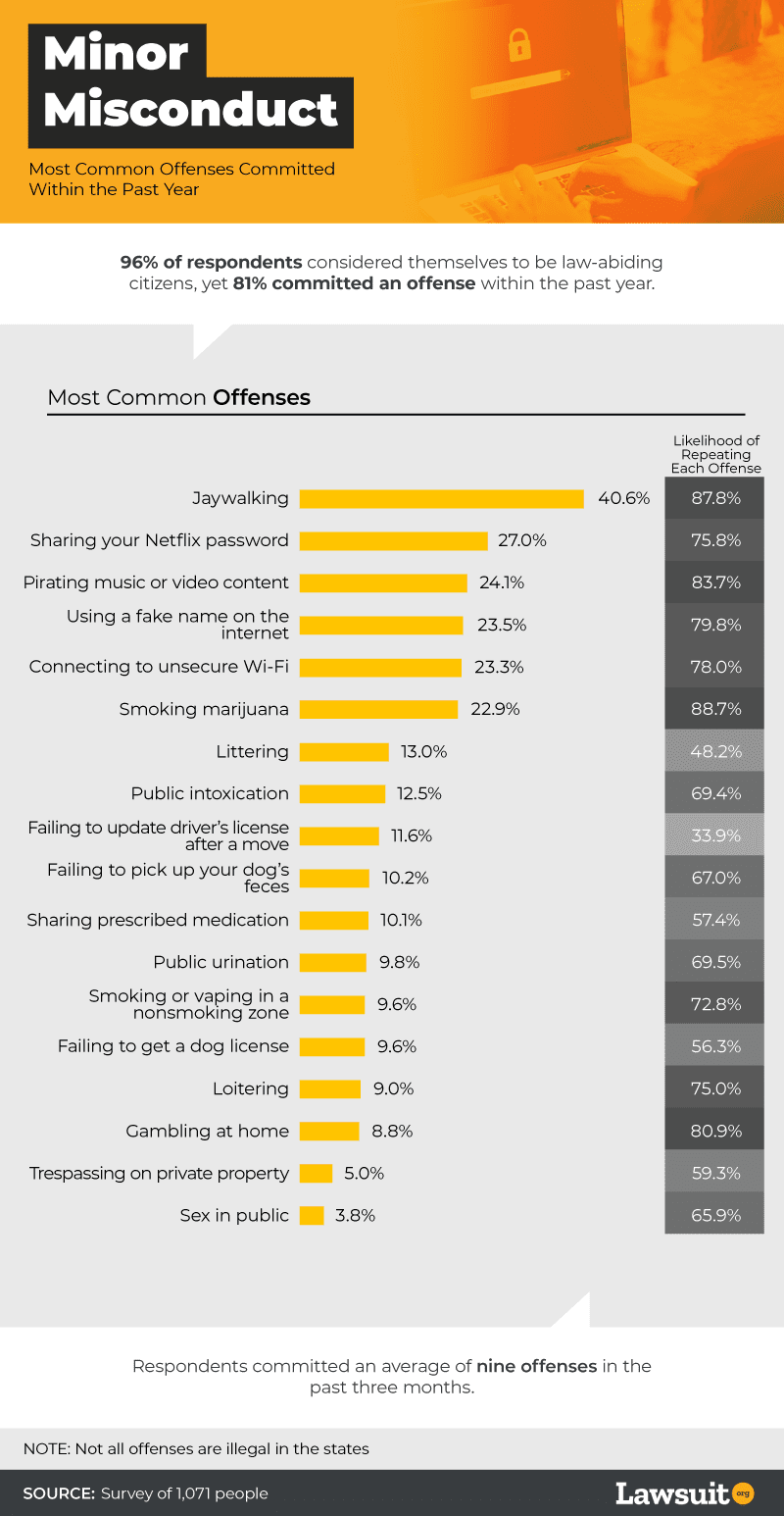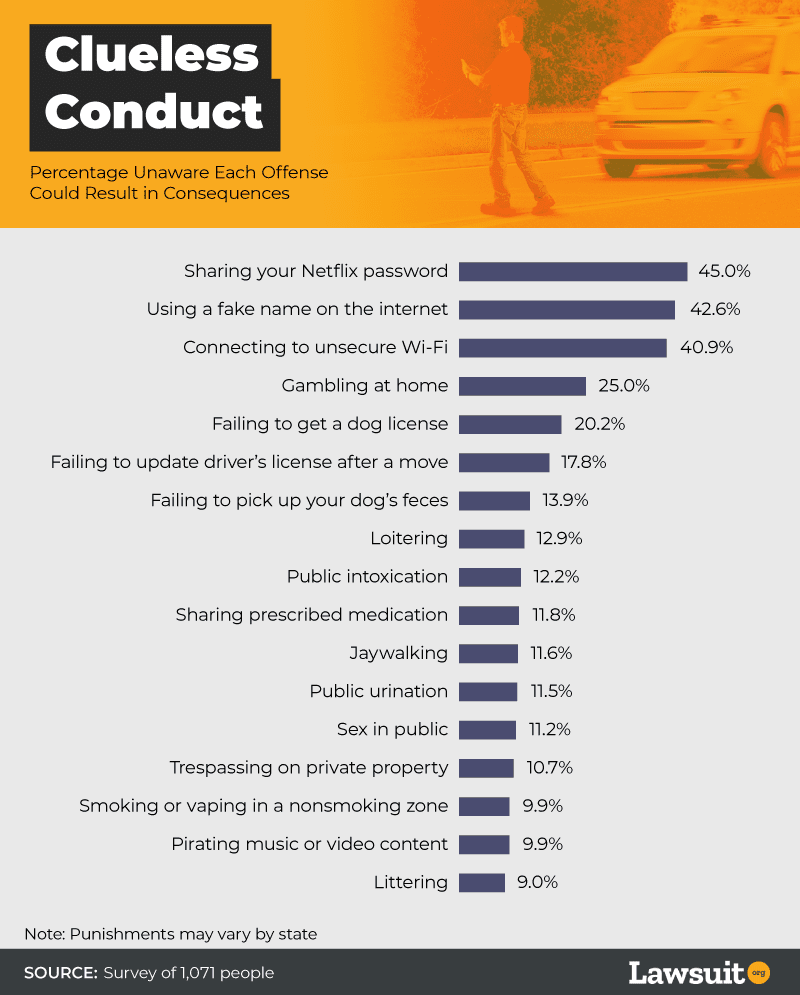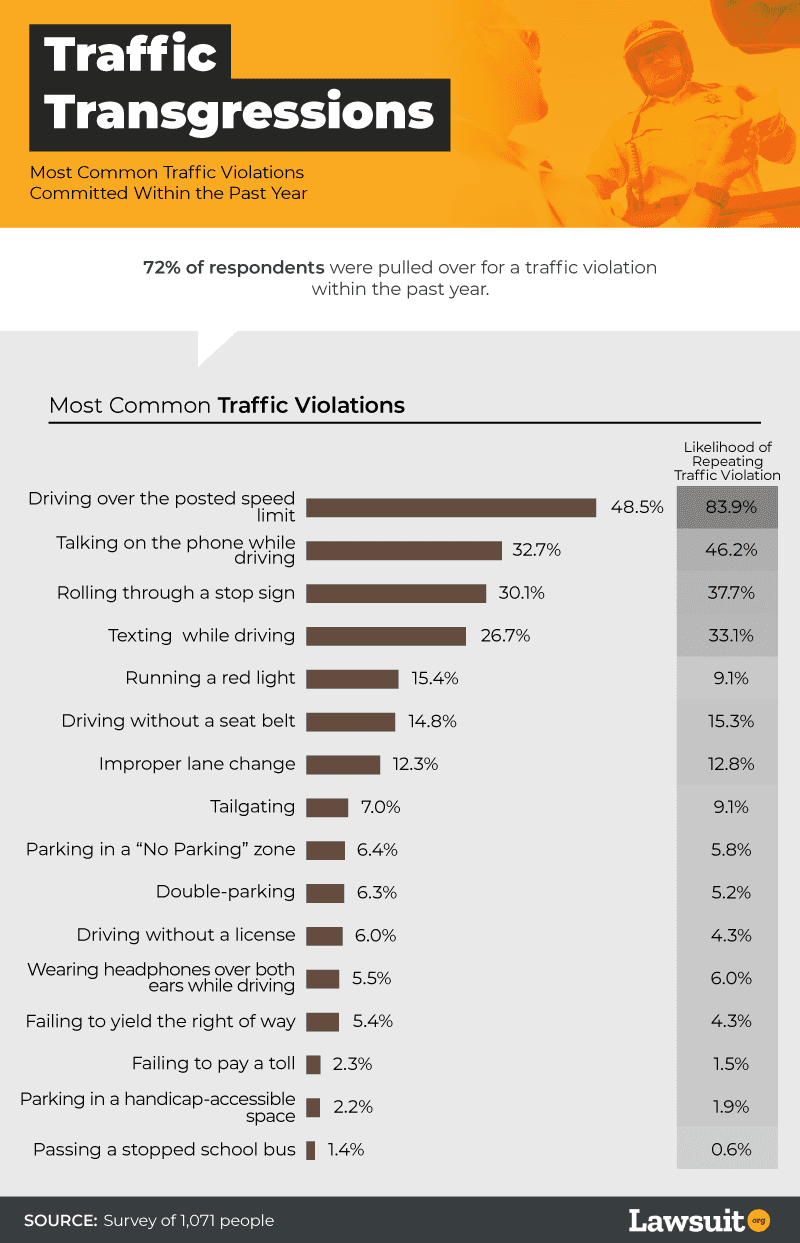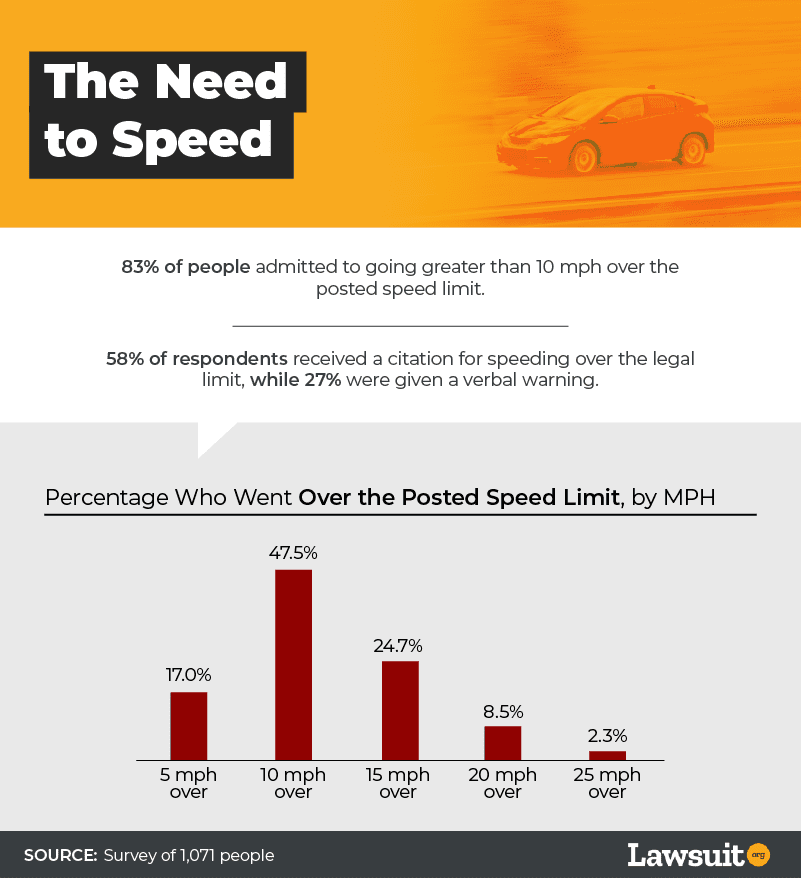Accidental Criminals?
Pop culture crime (think “Breaking Bad,” “Law & Order,” and “CSI”) often showcases American heroes as those who work outside of the legal system to pursue a truer sense of justice. We’re used to rooting for the good guys as they do illegal things. But what if you’re not fighting to avenge your father’s murder or feed our families? What if you’re simply trying to cross the street or give a friend access to our Netflix account?
The U.S. legal code is a lengthy list to read, let alone memorize. Consequently, many Americans break the law unknowingly. And if they are aware, remorse is often absent. To find out just how often this happens, we surveyed 1,071 people about the minor offenses they’ve committed before and how likely they are to commit them again. We even took a look at how racial bias plays into the perception of breaking the law.
Curious to see if you truly fit the bill for a law-abiding citizen? Read on to find out where you may be (illegally) crossing the line.
Misdemeanors and Misbehaviors

Across the U.S., self-proclaimed law-abiding citizens admitted to infractions, both major and minor. Whether aware of their indiscretions, 81 percent of respondents committed a minor offense within the past year. However, 96 percent of those same people considered themselves to be law-abiding citizens.
The most commonly reported infraction was jaywalking, or “crossing a street in a place or in a way that is against traffic regulations.” Although impatience quickly arises while waiting for a green light, especially on an empty street, it’s clear why jaywalking is illegal. Recent statistics tell us that pedestrian deaths account for a larger proportion of traffic fatalities than they have in the last 33 years. In light of this and the relatively small benefit of crossing the street a few seconds early, it’s certainly best to follow the traffic laws and avoid jaywalking at all costs.
The second most common offense was sharing Netflix passwords. Twenty-seven percent of respondents admitted to sharing their Netflix passwords with someone who wasn’t paying for the account. It’s so common, in fact, that Netflix reportedly loses around $500 million a year in revenue to illegally shared logins. Remorse was scarce, however, as nearly 76 percent of these sharers confessed they would be willing to do so again.
Much more obvious infractions, such as the sharing of prescription medications and public urination, were committed much more infrequently: 10.1 and 9.8 percent of the time, respectively. More than half of the people who broke these rules, however, expressed a propensity to commit the same offense again.
Unaware of the Legal Consequences

Unfortunately, not knowing you are breaking the law does not make it any less illegal. Fifty-seven percent of respondents were unaware that carrying a permanent marker in public is illegal in several states. While this law is in effect for anti-graffiti purposes, there are plenty of other perfectly legitimate reasons not to be carrying a Sharpie. It’s up to you whether those reasons are worth the $50 fine the action can incur.
Another common knowledge gap concerned the sharing of Netflix passwords. Forty-five percent of the people studied were unaware that sharing their Netflix logins is technically illegal.
Poker night could get you into trouble as well, depending on the stakes. A fourth of the people surveyed did not know that gambling, even in the comfort of their own home, was illegal. Fortunately for the environment, only 9 percent of respondents didn’t know that it was illegal to litter.
Common Traffic Infractions

When it comes to driving, rules and regulations are often expressed as literal signposts, so drivers are typically aware of the laws they drive under. Even so, 72 percent of drivers were pulled over for a traffic violation within the past year. Most commonly committed? Driving over the speed limit (over 48 percent), talking on the phone while driving (nearly 33 percent), and rolling through stop signs (30 percent).
Although states vary in their legal approaches to talking on the phone while driving, texting while driving physically requires a driver to take his or her eyes off the road, creating an obviously dangerous scenario. Regardless, almost 27 percent of respondents admitted to texting behind the wheel. Even more shocking is that 33 percent of those texting and driving admitted they would be likely to do it again. While we cannot assume the nature of those texts, the likelihood of them being more important than the lives of other people is infinitesimally small. While safety commercials warn drivers against the act over and over, it’s worth repeating: Don’t text and drive.
More Miles Per Hour

For obvious reasons, it is illegal to drive over the posted speed limit. Running late for a meeting or overwhelming impatience do not constitute adequate excuses. Even so, 58 percent of respondents received a citation for going faster than the legal limit, and another 27 percent were given a verbal warning for the same infraction.
While legal punishments may vary, there are also severe emotional repercussions to consider, like the lifelong guilt of physically injuring or killing another person on the road. Driving just 10 mph over the speed limit (which over 47 of respondents admitting to doing) can cause serious – or even fatal – outcomes. Driving the speed limit not only signals respect for the law, but also for the safety and well-being of those around you.
Conclusion
Although laws continue to be written in the U.S., this study has shown the American propensity to disregard legal codes. Even those who consider themselves law-abiding may still choose to skip over a law or two.
Whether it’s a driver going over the speed limit, a pedestrian attempting to jaywalk, or even a law enforcement officer pulling someone over, we tend to adhere to our personal moral codes more often than our legal codes. Ultimately, the law does not enforce the ethical fortitude of a country or community. People do. So please, follow the law to whatever extent possible, be kind to one another.
Methodology and Limitations
For this study, we gathered responses from 1,071 people through online surveys administered on Amazon’s Mechanical Turk. Of the 1,071 people polled, 56.5 percent identified as millennials, 28.8 percent were a part of Generation X, and 12.3 percent were baby boomers. The remaining 2.4 percent consisted of participants who were either a part of Generation Z or the silent generation. Additionally, 79.6 percent of respondents in our participant pool were white, 7.4 percent were Asian or Asian-American, 7.3 percent were black or African-American, and 5.6 percent were Hispanic. To qualify for this survey, participants must have been 18 years or older. An attention-check question was used to ensure participants were paying attention. Those who failed to answer an attention check correctly or entered inconsistent data were disqualified.
We compiled a list of minor offenses, popular bans, and traffic violations from several reputable sources – some were illegal, and some were not. A limitation of this project is that rules and laws are enforced differently by states. What is legal in one state may be illegal in another. Additionally, another limitation of this study is that the data rely on self-reporting. Self-reported data is subject, but not limited to: attribution, exaggeration, and telescoping. Claims made in this study have not been tested for statistical significance. These findings have not been reviewed by law enforcement or legal experts and should not be imitated. Breaking the law is dangerous and can result in legal consequences. This content was created for entertainment purposes only.
Sources
- https://www.law.cornell.edu/uscode/text
- http://www.ncsl.org/research/transportation/pedestrian-crossing-50-state-summary.aspx
- https://www.ghsa.org/sites/default/files/2018-03/pedestrians_18.pdf
- https://www.thesimpledollar.com/is-it-ok-to-share-your-netflix-account-the-lowdown-on-log-in-sharing-at-nine-popular-services/
- http://www.nyc.gov/html/nograffiti/html/legislation.html
- http://www.ncsl.org/research/transportation/cellular-phone-use-and-texting-while-driving-laws.aspx
- https://www.dmv.org/traffic-ticket-fines-and-penalties.php
- https://www.counterpunch.org/2017/11/30/afraid-of-being-pulled-over-by-police-you-should-be/
- https://www.washingtonpost.com/news/wonk/wp/2014/09/09/you-really-can-get-pulled-over-for-driving-while-black-federal-statistics-show/?utm_term=.2737dc67913e
Fair Use Statement
You may be beginning to question just how often you’ve done something illegal without even knowing. Rest assured, it is perfectly legal to share this article for noncommercial purposes with others, so long as you link back to this page and its authors.
